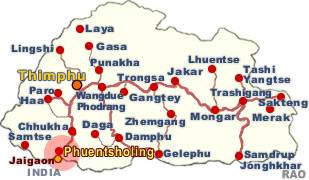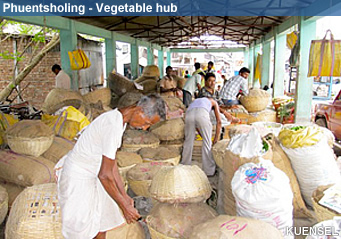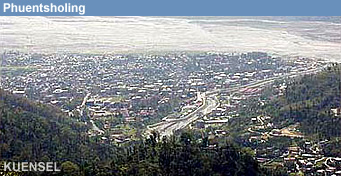 |
Bhutan's
Economy Phuentsholing |
|
 |
Bhutan Information |
|
|
 |
|
Phuentsholing: The vegetable hub of the region
|
 |
A wholesale market across the border that draws merchants from far and wide
 |
|
Falakata, 80km from Phuentsholing, is a small nondescript town about 20km off the Indian highway NH 31.
Twice a week, one edge of this town, bubbles with activity, as bullock carts, auto rickshaws and trucks ferrying tonnes and tonnes of vegetables, packed in huge bamboo baskets and brown jute sacks, are unloaded at its wholesale vegetable market, known as the sabji mandi (vegetable place) among the locals.
|
|
The buyers are from the neighbouring hills of Darjeeling and Kalimpong, as well as grocery merchants from Bhutan, who supply greens to the western districts.
Bidding and buying begin at around four in the morning and, by 10 am, almost all the produce in the market is sold. The 60-year old wholesale market that opens on Tuesdays and Fridays is made up of tall concrete sheds and makeshift huts, and looks more run down than the old vegetable market in Thimphu. With the vegetable supply season in India nearing its end, vegetable prices ranged from Nu 5 to Nu 20 a kg two weeks ago for vegetables, such as cabbage, potato, chili, cauliflower and beans.
 |
| Wholesale: A section of the Falakata market |
|
But prices fluctuate almost every day, depending on demand and supply. The vegetable season is at its peak from November to March.
Although it is not known when vegetable exports to Bhutan actually began, the secretary of Falakata fruit and vegetable merchants' association, Debasish Kar, said Bhutanese vendors have been coming to the market for two decades now.
|
|
In a week, about 20 truckloads of vegetables leave for the western parts of Bhutan from Falakata, traders said. Debasish Kar said the traders are now well acquainted with Bhutanese vendors and that, at times, they are given credit as well. Today, there are around 25 vegetable traders and six fruit traders at the market. Except for watermelon, other fruits are brought in from other Indian states, said traders.
|
A vegetable vendor from Wangduephodrang, who was at the market, said she visits the market once a week. "For us, who don't own trucks or DCMs, we reserve one from Phuentsholing to Falakata and then to our destinations in western Bhutan," she said. "It's tedious."
For a sack or basket (tokri) of vegetables that weighs around 50kg, Nu 100 is paid as transportation cost from Falakata to destinations in western Bhutan.
|
 |
By the time the vegetables get to their destinations, prices are threefold higher.
Vegetable vendors justify the increase. Tandin, 41, a vendor at the centenary farmers' market, said they have to keep a high profit margin to cover up losses, because the products are perishable and the transportation cost keeps increasing.
"When it goes up in Falakata, it goes up in Bhutan as well," he said.
Other vendors said that, with an increasing number of vegetable vendor in the market, it's not possible to sell whatever they've brought from Falakata. "The losses for unsold products have to be borne by the vendors alone," one said.
The problem of inconsistency in weight was another issue. When weighed at Falakata, it comes accurate but, when weighed in Bhutan, it turns out less at times, according to a Thimphu based vendor.
| Contributed
by Kinga Dema, KUENSEL, Bhutan's National newspaper, 2011 |
 |
| Information on Bhutan |
 |
|





